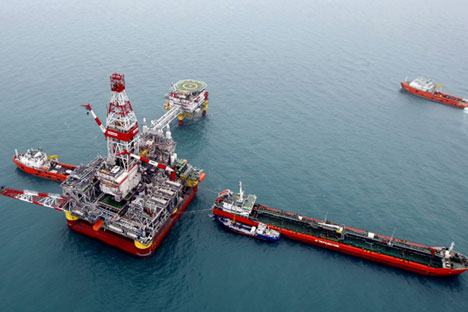
Government is considering reducing oil output on eve of next OPEC meeting.Source: TASS
World oil prices have been on the decline since the middle of the year. Prices for the primary benchmarks (American WTI and North Sea Brent) have plummeted from $105-$110 per barrel to less than $80 per barrel, a phenomenon not seen since 2010. On November 24, Russian Finance Minister Anton Siluanov said that this 30 percent drop may spell a loss of $90-$100 billion for the Russian economy.
The Russian government has begun considering possible ways to prop up oil prices. One potential step, proposed by Energy Minister Alexander Novak, is to cut production. However, he noted that the authorities have yet to make a decision on the matter.
“This issue requires careful study. Our budget very strongly depends on payments from the oil industry. We don’t have technology like they do in Saudi Arabia to quickly reduce or expand production,” the minister said.
Russia is one of the largest oil producers in the world, with a daily output comparable only with two other players on the global oil market – Saudi Arabia and the United States. In 2013, the Saudis extracted 11.5 million barrels of oil a day, the Russians produced 10.8 million barrels, while the Americans were close behind with 10 million barrels. Daily output is several times less in all the other oil-producing countries, at around 3.1-4.2 million barrels.
However, Russia is an independent player on the market, unlike Saudi Arabia, which produces in conjunction with another 11 countries in the OPEC cartel. OPEC is responsible for 43 percent of total global production, and its members always coordinate their actions. When prices need to be boosted, they decrease supply, or vice versa. Russia produces three times less oil than the OPEC countries combined.
Going it alone
“The Russians have no chance alone in the game against the Saudis, who don’t want to reduce production,” says Nikolai Isain, an expert at the Institute for Energy Strategy. First of all, Russia produces as much oil as its technical capabilities allow, while Saudi Arabia has free capacities to raise output by at least 3 million barrels a day. If it wants to influence global oil prices, Russia would need to slash production by at least 4 million barrels a day; that is, by more than a third.
In theory, that would drive up oil prices by about $15-$25 a barrel, Valery Polkhovsky from Forex Club says. Russia could therefore bring prices back to approximately $100 a barrel, which is a price it considers to be comfortable and the price that is used in its 2015 budget.
However, Russia has a lot to lose by producing less. For example, Russian oil producers would see lower revenues, which accordingly would mean lower tax payments to the budget.
Furthermore, Russia risks losing its traditional sales markets. “Russia’s withdrawal from the market would cheer Iran, Saudi Arabia, and other producers. Firstly, prices would rise, and secondly, they would be able to expand export volumes at these high prices,” says Polkhovsky.
Russia would also relinquish its status as a reliable supplier because oil is delivered under long-term contracts. But most importantly, it would be extremely difficult to bring Russian oil back to the market.
According to the newspaper Vzglyad’s sources, if it wants to resist OPEC, Moscow needs to join forces with other oil producers.
Better together
The easiest way to do this would be to bring the CIS countries (the former Soviet republics) together. However, these countries produce no more than a quarter of the amount of oil Russia produces, so they would not have any major influence on the world market, Isain from the Institute for Energy Strategy said.
There have already been attempts to create an alternative to OPEC. For example, the Shanghai Cooperation Organization, which includes Kazakhstan, Kyrgyzstan, Russia, Tajikistan, Uzbekistan, and China, tried to do so. However, these countries cannot compete with OPEC in terms of oil output.
In the end, if it wants to start influencing global oil prices, Russia needs to either establish relations with OPEC and become a member of the cartel or take advantage of the split within OPEC at the right time and in the right way. Several OPEC members, such as Iran, Iraq, Nigeria, Venezuela, and Ecuador, are in favor of reducing production as soon as possible, while the UAE and Kuwait are against it. The position of Saudi Arabia – the most influential member of OPEC – is not yet clear.
Meanwhile, “according to unofficial information, Russia and Saudi Arabia are currently conducting separate negotiations regarding joint action aimed at raising oil prices,” analyst at FK Uralsib Alexei Kokin says.
According to Russian Foreign Minister Sergei Lavrov, both Russia and Saudi Arabia agree that pricing should be market-based. “Both our Saudi partners and we are against the market being affected as a result of certain political designs,” Lavrov told reporters following talks with Saudi Foreign Minister Saud al-Faisal on November 21.
The next OPEC meeting is scheduled for November 27.
Based on material published by Vzglyad and Gazeta.ru.
All rights reserved by Rossiyskaya Gazeta.
Subscribe
to our newsletter!
Get the week's best stories straight to your inbox